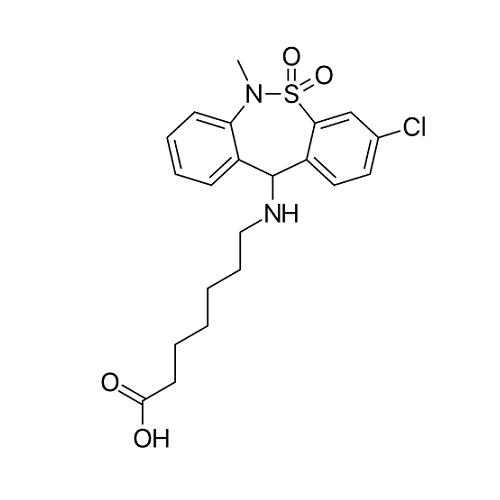Monographs licensed from Therapeutic Research Center, LLC
Alternate names: Coaxil, Stablon, Tiannaa
Actions: General, Neurologic, Respiratory
Alternate names: Coaxil, Stablon, Tiannaa
Actions: General, Neurologic, Respiratory
Tianeptine is a prescription drug used for depression in some European, Asian, and Latin American countries. It is not approved for use in the US.
Tianeptine affects brain chemicals. It seems to affect mood when used in low doses. In higher doses, it works like an opioid and can cause addiction and other serious side effects. It can also cause withdrawal.
People use tianeptine for depression. It is also used for pain, asthma, anxiety, and many other conditions, but there is no good scientific evidence to support these other uses. Tianeptine might also be unsafe.
Tianeptine is on the US FDA Advisory List of ingredients that do not qualify for use in dietary supplements.
When taken by mouth: Tianeptine is possibly unsafe. While tianeptine is available by prescription in certain countries, it has a risk of misuse and abuse. Taking high doses of tianeptine can cause drowsiness, confusion, difficulty breathing, coma, and death. Long-term use can cause dependence and withdrawal.
Special Precautions & Warnings:
Pregnancy: Tianeptine is possibly unsafe when taken by mouth during pregnancy. It can cause the infant to be born addicted to tianeptine.
Breast-feeding: There isn't enough reliable information about the safety of tianeptine when breast-feeding. But other drugs that are similar to tianeptine are known to enter the breastmilk. Stay on the safe side and avoid use.
History of substance use disorder: Using tianeptine for a long time can cause dependence and withdrawal, especially in people that have a history of substance use disorder.
Surgery: High doses of tianeptine might have sedative effects. Anesthesia and other medications used during and after surgery might increase this effect. Stop taking tianeptine at least 2 weeks before a scheduled surgery.
NatMed Pro rates effectiveness based on scientific evidence according to the following scale: Effective, Likely Effective, Possibly Effective, Possibly Ineffective, Likely Ineffective, Ineffective, and Insufficient Evidence to Rate.
- Depression. Prescription tianeptine, which is not available in the US, seems to reduce symptoms of depression. It might work as well as some other medicines commonly used for depression.
There is interest in using tianeptine for a number of other purposes, but there isn't enough reliable information to say whether it might be helpful.
Tianeptine is available as a prescription drug in some countries, but it is not approved for use in drugs or dietary supplements in the US due to safety concerns. Taking tianeptine can lead to dependence and withdrawal.
Interactions with pharmaceuticals
Alcohol
Interaction Rating=Moderate Be cautious with this combination.
Alcohol can decrease how quickly the body breaks down tianeptine. Taking tianeptine along with alcohol might increase the levels of tianeptine in the body and increase the risk for side effects.
Aspirin
Interaction Rating=Moderate Be cautious with this combination.
Long-term aspirin use might increase the levels of tianeptine in the body. This can increase the risk of side effects from tianeptine.
Medications for depression (MAOIs)
Interaction Rating=Major Do not take this combination.
Tianeptine contains a chemical that affects the body. This chemical might increase serious side effects of some medications used for depression.
Some common MAOIs include phenelzine (Nardil), selegiline (Zelapar), and tranylcypromine (Parnate).
Sedative medications (CNS depressants)
Interaction Rating=Moderate Be cautious with this combination.
Tianeptine might cause sleepiness and slowed breathing. Some medications, called sedatives, can also cause sleepiness and slowed breathing. Taking tianeptine with sedative medications might cause breathing problems and/or too much sleepiness.
Interactions with herbs & supplements
Herbs and supplements with sedative properties: Tianeptine might cause sleepiness and slowed breathing. Taking it along with other supplements with similar effects might cause too much sleepiness and/or slowed breathing in some people. Examples of supplements with this effect include hops, kava, L-tryptophan, melatonin, and valerian.
There are no known interactions with foods.
vital.ly has licensed monographs from TRC Healthcare.
This monograph was last reviewed on 29/06/2023 10:00:00. Monographs are reviewed and/or updated multiple times per month and at least once per year.
Natural Medicines disclaims any responsibility related to medical consequences of using any medical product. Effort is made to ensure that the information contained in this monograph is accurate at the time it was published. Consumers and medical professionals who consult this monograph are cautioned that any medical or product related decision is the sole responsibility of the consumer and/or the health care professional. A legal License Agreement sets limitations on downloading, storing, or printing content from this Database. No reproduction of this monograph or any content from this Database is permitted without written permission from the publisher. It is unlawful to download, store, or distribute content from this site.
Natural Medicines rates safety based on scientific evidence according to the following scale: Likely Safe, Possibly Safe, Possibly Unsafe, Likely Unsafe, Unsafe, and Insufficient Evidence to Rate. For more information about Natural Medicines’ Safety Rating System,
click here.
The Natural Medicines Effectiveness Ratings are assigned for specific indications. A product might be rated "Possibly Effective" for one condition, but be rated "Likely Ineffective" for another condition, depending on the evidence. For more info
click here.





